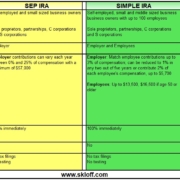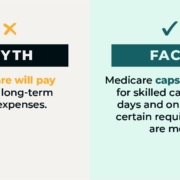How the Estate Tax Exemption Can Be a Tax Dream – Part 3

Money Matters – Skloff Financial Group Question of the Month – November 1, 2024
By Aaron Skloff, AIF, CFA, MBA
Q: We read ‘How a Gift Can Be a Tax Dream or a Tax Nightmare’ Part 1 and Part 2. We also read ‘How To (Legally) Avoid Taxes When Selling Your Home’ Part 1, Part 2 and Part 3. Furthermore, we read ‘How Gifting Versus Selling Your Home Can Be a Tax Dream or a Tax Nightmare’ Part 1, Part 2 and Part 3. Then, we read ‘How a Step-Up in Basis Can Be a Tax Dream’ Part 1, Part 2 and Part 3. Furthermore, we read ‘How Community Property States Versus Separate Property States Can Be a Tax Dream or a Tax Nightmare’ Part 1, Part 2, Part 3 and Part 4. Lastly, we read ‘How the Estate Tax Exemption Can Be a Tax Dream‘ Part 1 and Part 2. Can you provide estate planning strategies before the estate tax exemption collapses in 2026?
The Problem – The Estate Tax Exemption is Scheduled to Collapse in 2026
Effective 2026, the estate tax exemption is scheduled to collapse to an estimated $6.8 million.
The Solution –Estate Planning Strategies as 2026 Estate Tax Exemption Collapse Approaches
Life insurance can be a powerful estate planning tool, as life insurance proceeds are tax-free to beneficiaries. Unfortunately, per Section 2042 of the Internal Revenue Code, a decedent’s estate includes the value of life insurance proceeds. Without careful planning, life insurance proceeds can create expensive estate taxes. With careful planning, life insurance proceeds can be excluded from your taxable estate – a tax dream.
Are You Interested in Learning More?
Irrevocable Lie Insurance Trust (ILIT). Through an Irrevocable Life Insurance Trust (ILIT), life insurance proceeds can be excluded from your estate. Once the ILIT is created, you (Grantor) place a life insurance policy that insures your life into the trust for a group of beneficiaries. When used in conjunction with the Protected IRA Plus (PIPP), you can gain additional estate planning benefits. You make gifts to the ILIT each year, so the ILIT can pay the premiums on the policy. When you die (Decedent), the life insurance company pays the tax-free life insurance proceeds to the trust. Then, the trust pays the tax-free life insurance proceeds to the trust’s beneficiaries. Neither the estate, nor the trust, nor the trust’s beneficiaries pay taxes – a tax dream.
Let’s look at examples of outcomes for a single person and a married couple where they do not implement estate planning strategies versus where they implement estate planning strategies. All parties die in 2026. For simplicity, the assets do not appreciate, and the estate tax rate is rounded to 40%.
Single. If your assets are $14 million and you implement no estate planning strategies from 2024 to 2026, the total of your gifts and estate value after $3 million in taxable life insurance proceeds (outside ILIT) and taxes would be $12.92 million, after paying $4.08 million in estate taxes. Now, let’s implement estate planning strategies. Starting in 2024 with $14 million, you gift $200,000 not affecting your LETE. In 2025, you gift $200,000 not affecting your LETE and $13 million affecting your LETE. When you die in 2026, the total of your gifts and estate value after $3 million in tax-free life insurance proceeds (inside ILIT) and taxes would be $16.76 million, after paying $240,000 in estate taxes – a tax dream. See the table below.
Married. If your assets are $28 million and you implement no estate planning strategies from 2024 to 2026, the total of your gifts and estate value after $6 million in taxable life insurance proceeds (outside ILIT) and taxes would be $25.84 million, after paying $8.16 million in estate taxes. Now, let’s implement estate planning strategies. Starting in 2024 with $28 million, you gift $400,000 not affecting your LETE. In 2025, you gift $400,000 not affecting your LETE and $26 million affecting your LETE. When you die in 2026, the total of your gifts and estate value after $6 million in tax-free life insurance proceeds (inside ILIT) and taxes would be $33.52 million, after paying $480,000 in estate taxes – a tax dream. See the table below.
Click to Enlarge
Action Steps
Work closely with your Registered Investment Adviser (RIA) to reduce your taxes, and grow and preserve your wealth.
Aaron Skloff, Accredited Investment Fiduciary (AIF), Chartered Financial Analyst (CFA), Master of Business Administration (MBA) is CEO of Skloff Financial Group, a Registered Investment Advisory firm specializing in financial planning, investment management and benefits for small to middle sized companies. He can be contacted at www.skloff.com or 908-464-3060.














